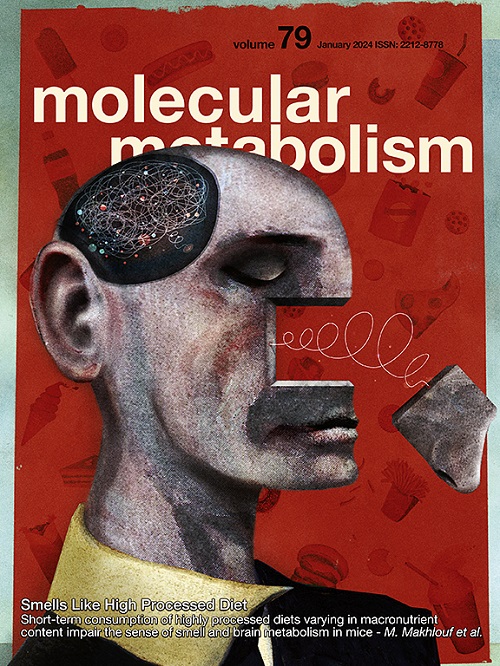构建嵌合小鼠胰岛,研究α细胞和δ细胞对β细胞特性的影响。
IF 6.6
2区 医学
Q1 ENDOCRINOLOGY & METABOLISM
引用次数: 0
摘要
目的:本研究旨在评估小鼠胰岛内α和δ细胞信号对β细胞的作用。具体来说,我们研究了这些信号如何调节β细胞中的葡萄糖敏感性、基因表达和功能。方法:我们首先采用之前的方案,通过添加CD81作为α细胞的阳性标记物,对α、β和δ细胞进行FACS纯化。接下来,我们开发了一种方法来重新聚集这些分类的细胞群,创造出具有不同比例的每种内分泌细胞类型的嵌合胰岛。我们利用这些嵌合胰岛来研究α细胞和δ细胞对β细胞葡萄糖敏感性、基因表达和功能的影响。结果:我们生成了含有所有三种内分泌细胞类型的嵌合胰岛,α + β细胞或仅含有β细胞。我们证明β细胞的葡萄糖敏感性和身份是独立于α细胞和δ细胞的信号。我们确定了一个基因子集,包括前肌啡肽、富马酸水合酶和Txnip,它们在β细胞中的表达依赖于通过胰高血糖素和胰高血糖素样肽受体作用的α细胞信号。最后,我们证明了在小鼠β细胞中,kcl介导的胰岛素分泌依赖于胰高血糖素受体的激活,而葡萄糖刺激的胰岛素分泌依赖于胰高血糖素样肽受体的激活。结论:我们开发了一种创新的、易于使用的模型来重建含有不同频率的α、β和δ细胞的嵌合胰岛。通过这种方法,我们对胰岛内α和δ细胞对β细胞特征的复杂调控机制提供了新的见解。本文章由计算机程序翻译,如有差异,请以英文原文为准。
Constructing chimeric mouse islets to study alpha- and delta-cell influence on beta-cell feature
Objectives
This study aimed to evaluate the role of alpha- and delta-cell signals on beta-cells within pancreatic mouse islets. Specifically, we investigated how these signals regulate glucose sensitivity, gene expression and function in beta-cells.
Methods
We first implemented our previous protocol to FACS purify alpha-, beta-, and delta-cells by adding CD81 as a positive marker for alpha-cells. We next developed an approach to reaggregate these sorted cell populations, creating chimeric islets with different proportions of each endocrine cell type. We used these chimeric islets to study the effect of alpha- and delta-cells on glucose sensitivity, gene expression and function in beta-cells.
Results
We generated chimeric islets containing either all three endocrine cell types, alpha- + beta-cells or only beta-cells. We demonstrate that beta-cell glucose sensitivity and identity are independent of signals from alpha- and delta-cells. We identified a subset of genes including Pro-dynorphin, Fumarate hydratase and Txnip whose expression in beta-cells depends on alpha-cells signals acting through the glucagon- and glucagon-like peptide receptors. Finally, we demonstrated that in mouse beta-cell, KCl-mediated insulin secretion relies on an activation of the glucagon-receptor, while glucose-stimulated insulin secretion depends on glucagon-like peptide receptor activation.
Conclusions
We developed an innovative and easy-to-use model to reconstruct chimeric islets containing different frequencies of alpha-, beta- and delta-cells. Through this approach, we provide new insights into the complex regulatory mechanisms governing the role of alpha and delta cells on beta-cell features within islets.
求助全文
通过发布文献求助,成功后即可免费获取论文全文。
去求助
来源期刊

Molecular Metabolism
ENDOCRINOLOGY & METABOLISM-
CiteScore
14.50
自引率
2.50%
发文量
219
审稿时长
43 days
期刊介绍:
Molecular Metabolism is a leading journal dedicated to sharing groundbreaking discoveries in the field of energy homeostasis and the underlying factors of metabolic disorders. These disorders include obesity, diabetes, cardiovascular disease, and cancer. Our journal focuses on publishing research driven by hypotheses and conducted to the highest standards, aiming to provide a mechanistic understanding of energy homeostasis-related behavior, physiology, and dysfunction.
We promote interdisciplinary science, covering a broad range of approaches from molecules to humans throughout the lifespan. Our goal is to contribute to transformative research in metabolism, which has the potential to revolutionize the field. By enabling progress in the prognosis, prevention, and ultimately the cure of metabolic disorders and their long-term complications, our journal seeks to better the future of health and well-being.
 求助内容:
求助内容: 应助结果提醒方式:
应助结果提醒方式:


